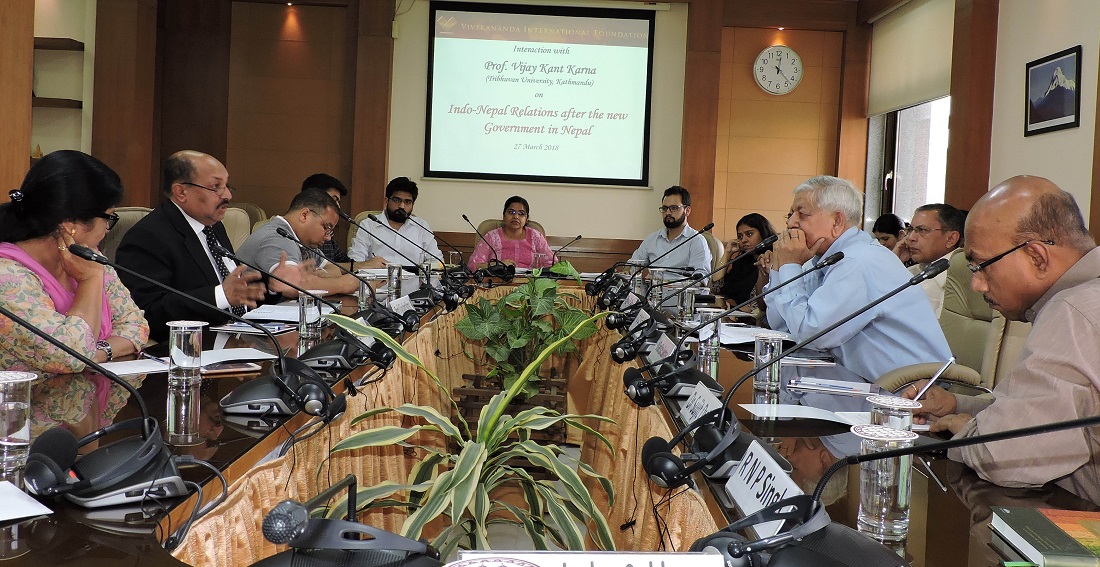An interaction on India-Nepal relations and future prospects was held at the VIF on 27 March, 2018, with Prof. Vijay Kant Karna as the lead speaker. The session began with opening remarks by Mr. Sahay who complemented the people of Nepal, the political parties and the Election Commission of Nepal for smooth conduct of the massive exercise of holding elections at the local, provincial and national levels over an extended period of time, in a peaceful manner that gave a clear mandate to the new democratic order.
In his address, Prof. Karna highlighted post-election political scenario in the country with the formation of Left Alliance Government by the Communist Party of Nepal (CPN) - Unified Marxist-Leninist, or CPN-UML, and CPN- Maoist Centre, or CPN- MC. It was pointed out that the election campaign of the left parties was mainly driven by anti-India rhetoric along with promises of rapid development through greater Chinese investments in the country.
As regards the opposition, it was felt that the Nepali Congress campaign lacked cohesiveness and clear strategy and that was the major factor behind its pathetic electoral performance. A general perception exists that Nepal was focusing more on its financial and developmental crisis than on human rights and social inclusion and that a tendency towards greater centralisation of power was getting evident by the actions of the victorious alliance. It was also mentioned that Nepal’s continuing challenges in dealing with the problems of marginalisation of women and minority groups such as Janjatis and Dalits would have to be addressed by the new government on priority. An aggressive revival of nationalism is visible today, which was a characteristic feature in Nepal during the 1960’s, and that has been based on anti-India and anti-Terai sentiment.

On political issues, the proposed merger of the main constituents of the Left Alliance was flagged as a serious political challenge, particularly with the Maoist leader Prachanda demanding equal role and significance in the party. This tussle could come in the way of Nepalese desire for a stable government after having seen power change hands frequently in the past.
Discussing the future of India-Nepal relations, the central theme of the event, the speaker and participants alike pointed out Nepal’s increasing intimacy with China as a key factor impacting its relations with India. The indispensable position India has in Nepal’s foreign policy due to the geography, historicity, culture and people-to-people relations were brought to the fore. The recent visit of Indian Foreign Minister to Nepal and the upcoming visit of Prime Minister to India in April, 2018, were mentioned are signs of a ‘re-set’ in the relationship between two countries to take on a more positive trajectory than the present time.
The fact of growing Chinese involvement in Nepalese developmental efforts was a reality which India will have to accept. However, it was equally important for Nepal, in its own interest, to have a close look at the apparent lack of clarity in Chinese repayment of loans to avoid the kind of ‘debt-trap’ that came to the fore in Sri Lanka, with hints of similar problems likely in Pakistan and Maldives as well. Chinese or any other foreign investment should not be seen as a solution to all problems. Participants agreed that India will continue to assist Nepal in every possible manner in its march towards democracy and in its quest for economic development.
The meeting was chaired by Mr. C D Sahay, Senior Fellow and Group Head, VIF, while the participants included members of the VIF faculty, former diplomats and select invitees.


